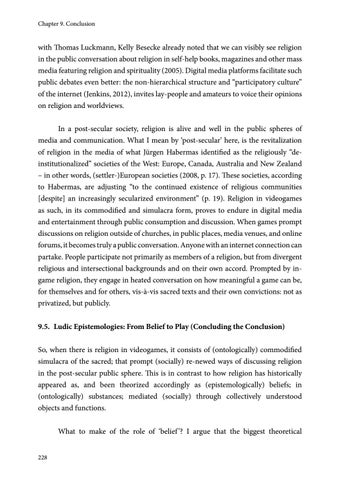Chapter 9. Conclusion
with Thomas Luckmann, Kelly Besecke already noted that we can visibly see religion in the public conversation about religion in self-help books, magazines and other mass media featuring religion and spirituality (2005). Digital media platforms facilitate such public debates even better: the non-hierarchical structure and “participatory culture” of the internet (Jenkins, 2012), invites lay-people and amateurs to voice their opinions on religion and worldviews. In a post-secular society, religion is alive and well in the public spheres of media and communication. What I mean by ‘post-secular’ here, is the revitalization of religion in the media of what Jürgen Habermas identified as the religiously “deinstitutionalized” societies of the West: Europe, Canada, Australia and New Zealand – in other words, (settler-)European societies (2008, p. 17). These societies, according to Habermas, are adjusting “to the continued existence of religious communities [despite] an increasingly secularized environment” (p. 19). Religion in videogames as such, in its commodified and simulacra form, proves to endure in digital media and entertainment through public consumption and discussion. When games prompt discussions on religion outside of churches, in public places, media venues, and online forums, it becomes truly a public conversation. Anyone with an internet connection can partake. People participate not primarily as members of a religion, but from divergent religious and intersectional backgrounds and on their own accord. Prompted by ingame religion, they engage in heated conversation on how meaningful a game can be, for themselves and for others, vis-à-vis sacred texts and their own convictions: not as privatized, but publicly. 9.5. Ludic Epistemologies: From Belief to Play (Concluding the Conclusion) So, when there is religion in videogames, it consists of (ontologically) commodified simulacra of the sacred; that prompt (socially) re-newed ways of discussing religion in the post-secular public sphere. This is in contrast to how religion has historically appeared as, and been theorized accordingly as (epistemologically) beliefs; in (ontologically) substances; mediated (socially) through collectively understood objects and functions. What to make of the role of ‘belief ’? I argue that the biggest theoretical 228



